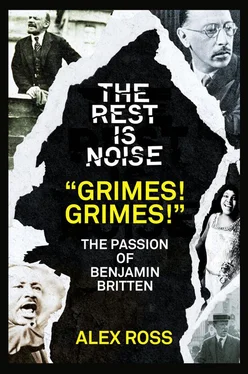Young Britten assembled a personal language out of whatever pleased his uncommonly sharp ear. His harmonic vocabulary stemmed both from continental models such as Berg and Stravinsky and from the more adventurous British composers of the time, particularly Holst, composer of The Planets . From Holst, Britten seems to have picked up the device of the enharmonic change, in which one note holds steady while the harmony pivots to a distant chord—a trick much used by twentieth-century tonal composers, notably Shostakovich. Britten also developed the habit of wavering bluesily between major and minor modes by modifying the third degree of the scale. Greatly impressed by a 1936 London production of Lady Macbeth of the Mtsensk District , he mastered the Shostakovichian arts of parody and grotesquerie, and also took inspiration from operetta, vaudeville, and popular song.
Mrs. Britten died in 1937, and her will allowed Benjamin to purchase the Old Mill, in the tiny village of Snape, outside Aldeburgh—an eighteenth-century round house with a view of the river and marshes and the sea beyond.
Britten was distraught by his mother’s death, but he also felt liberated from the role of darling boy. For the first time he began seriously to explore his sexuality, and immediately felt torn between relationships with gay men his own age—in 1937 he got to know Peter Pears, the future love of his life—and romantically tinged attachments to teenagers. A friendship with the eighteen-year-old Wulff Scherchen, son of the conductor Hermann Scherchen, teetered on the edge of sexual contact. Eventually, Auden would confront Britten with his enthrallment to “thin-as-a-board juveniles, i.e. to the sexless and innocent.” It was a way of evading the disorder of adulthood, Auden said, a false flight into memories of boyhood. Auden further criticized his friend’s tendency to surround himself with a cocoon of caretakers and admirers—“to build yourself a warm nest of love .. . by playing the lovable talented little boy.” Auden concluded: “If you are really to develop to your full stature, you will have, I think, to suffer, and make others suffer.”
Britten ignored the advice. The sexless and the innocent attracted him to the end. He kept trying to build his warm nest of love, although some musicians and administrators who worked with him at the Aldeburgh Festival in later years found the love in short supply; the tenor Robert Tear recalled “an atmosphere laden with waspishness, bitterness, cold, hard eyes, with cabalistic meetings.” Britten developed the unattractive habit of cutting off contact with devoted associates who disappointed him or outlived their usefulness. Ironically, Auden himself was among the first who suffered. That perceptive but intrusive letter he sent to Britten in 1942 derailed their friendship.
Over the years, the list of ex-friends grew long enough that Britten reportedly called them his “corpses.” Yet he never ceased to think of himself as a vulnerable child: he acted not out of malice but out of a need to preserve the illusion of a boyish paradise. In the Thomas Hardy song cycle Winter Words , he set the poem “Before Life and After,” which may be his most personal statement. Over a solemn procession of triadic harmonies, the singer recalls “a time there was .. . when all went well,” a primal state before “the disease of feeling germed,” and wonders whether such a time could come again. His plaint becomes a sob: “How long, how long, how long, how long, how long?”
In April 1939, Britten traveled to America in the company of his increasingly close friend Peter Pears, with the intention of settling there permanently. The main reason for this unexpected move was sexual-psychological: the ill-defined relationship with Wulff Scherchen had grown so fraught that Britten felt the need to leave the country. But there was also a political explanation. Auden had moved to America at the beginning of the year, seeking an exit from what he would call, in his famous poem “In Memory of W. B. Yeats,” the “nightmare of the dark.” America was a new land, a liberal land, a refuge from the Europe of Fascism and appeasement. On a practical level, Britten had received a tentative job offer from Hollywood, or “Holywood,” as he called it in a letter to Scherchen. For the BBC he had composed some brawny music to accompany a King Arthur drama, and the director Lewis Milestone—for whom Aaron Copland later wrote Of Mice and Men —wanted Britten to score The Knights of the Round Table . Nothing came of that plan, and it’s just as well, since Britten’s sensitive ego would probably have suffered terrible scars in the movie business.
Much of what Britten knew of America came from Copland, whom he had befriended in England the previous year. On a visit to the Old Mill, Copland had played through his children’s opera The Second Hurricane . Britten was charmed by the freshness of the vocal writing and by the harmonious picture of young comrades on a common mission. “It would be nice to keep in touch with your triumphs and ‘problems,’ ” Copland subsequently wrote, “problems” being young males.
Britten rapidly disabused himself of the idea of becoming an American, although the outbreak of World War II and the attendant dangers of transatlantic travel prevented him from returning to England until 1942. He tried valiantly to adapt to the eccentric, bohemian lifestyle that Auden had cultivated in New York, but he could not find the cocoon of comfort he required. In the fall of 1940, he and Pears moved into a communal house hold at 7 Middagh Street, in Brooklyn Heights, overlooking the bridge. Living with them were Auden, Paul and Jane Bowles, the editor George Davis, and, up in the attic, Thomas Mann’s son Golo. The high-society stripper Gypsy Rose Lee was a frequent guest; Salvador Dalí, Christopher Isher-wood, Leonard Bernstein, and Golo’s brother Klaus also dropped by. When the Bowleses left, the novelist Carson McCullers moved in, with her alcoholic insanity.
Unable to work, Britten found asylum with the Mayers, German refugees on Long Island. “Everything here is crazes—crazes—crazes,” he wrote to his brother-in-law back home. “I’m gradually realising that I’m English—& as a composer I suppose I feel I want more definite roots than other people.”
Yet Britten gained much from his American experience. From Broadway shows he learned dramatic tricks that would serve him well in his operas from Grimes
Конец ознакомительного фрагмента.
Текст предоставлен ООО «ЛитРес».
Прочитайте эту книгу целиком, купив полную легальную версию на ЛитРес.
Безопасно оплатить книгу можно банковской картой Visa, MasterCard, Maestro, со счета мобильного телефона, с платежного терминала, в салоне МТС или Связной, через PayPal, WebMoney, Яндекс.Деньги, QIWI Кошелек, бонусными картами или другим удобным Вам способом.












